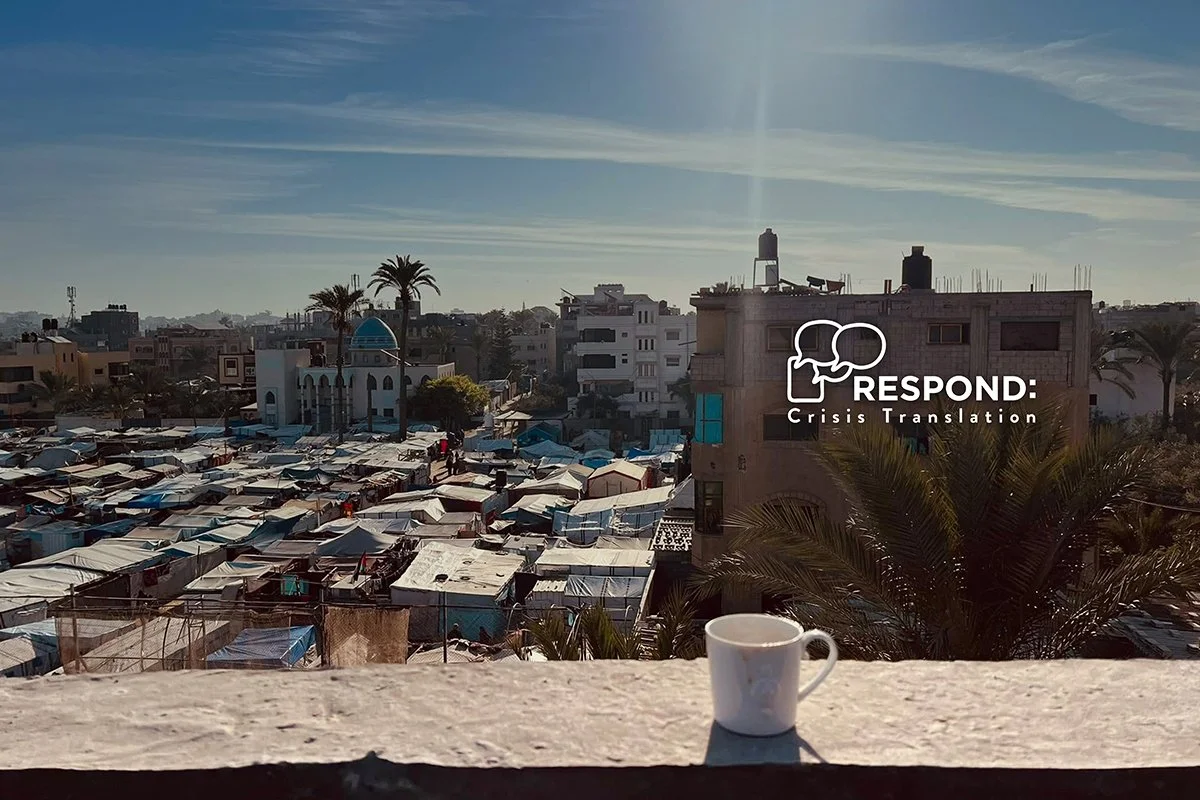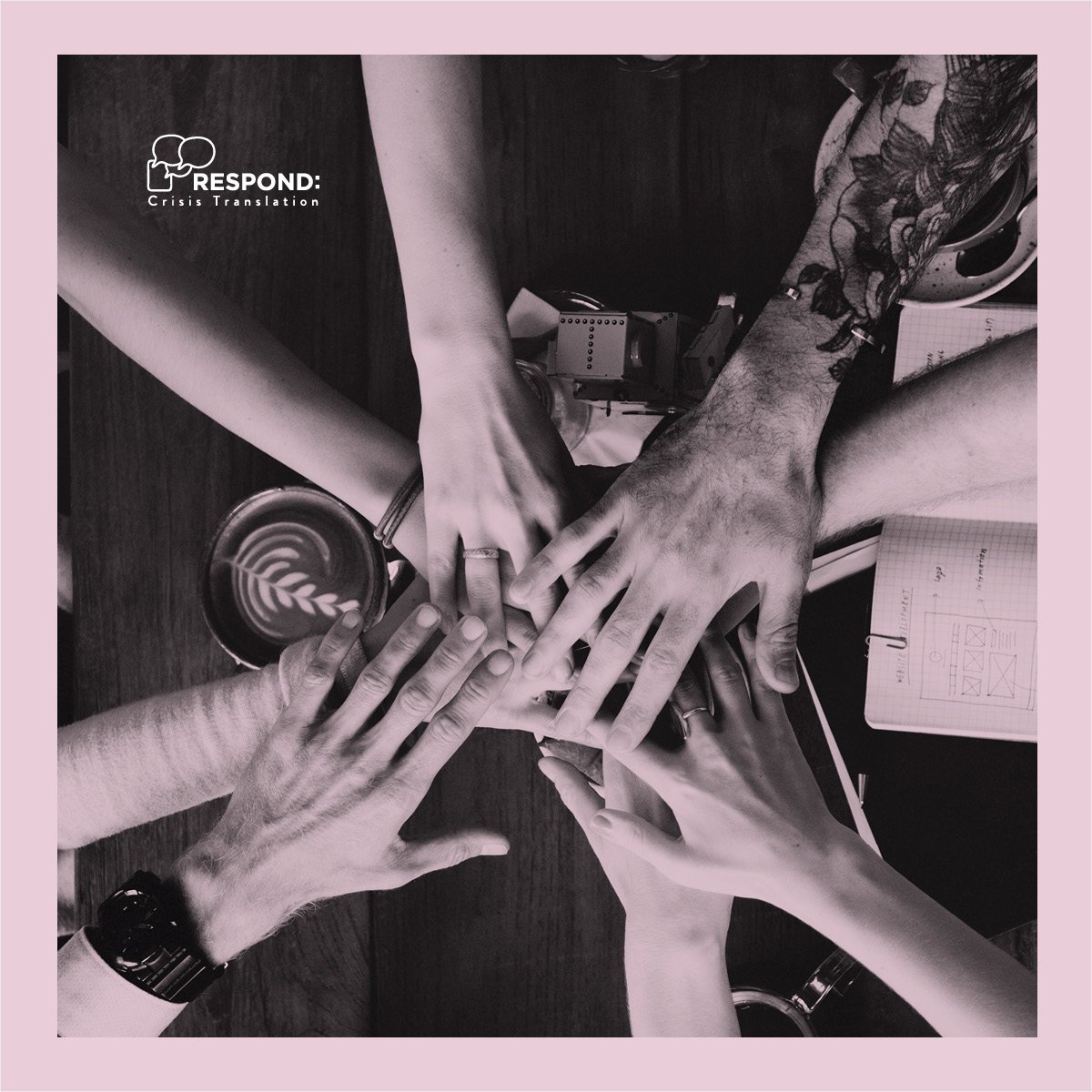Respond Blog
Gaza Diaries 2 : displacement
Since I was displaced from Gaza City to Deir al-Balah, I have been living through an extraordinary human experience. I still feel traumatized by the experience of displacement, the fear, and being forced to flee Gaza in order to survive.
We temporarily took shelter in a friend’s house. We sleep in a concrete room where their aunt lives.The room is small, dark, and unpainted. We spread a mat on the floor.
My name is Gheed, and I’m writing to you from northern Gaza.
Thank you for giving to the truly incredible fundraiser organized by Respond Crisis Translation (RCT), Naomi and Kim. I have already received many of the funds and I am utterly blown away – I cannot begin to thank you all. This type of support allows me to feel hope and …
Freedom and Dignity for Translators in Gaza - RCT Arabic Team Co-Director
My name is Gheed, Respond Crisis Translation Arabic Team Co-Director. I’m writing this from northern Gaza. I’m the sole breadwinner for my family. In the early weeks of the war, I was forced to flee my home in Gaza City under relentless bombardment. The Israeli military had issued warnings that the city would be wiped out entirely…
Our Translators and Arabic Team Director in Gaza are Facing Genocide and Famine
Palestinians in Gaza are dying of starvation due to the mass famine imposed by Israel’s siege. Twelve translators on our team and our Arabic Team Director, are amongst the hundreds of thousands of Palestinians facing starvation …
“My Journey” - Athar Abu Samra, RCT Translator from Gaza
My journey with Respond Crisis Translation began after I graduated with a degree in English Translation in Gaza. I had heard so much about Respond’s supportive and empowering environment through online platforms and translator communities, …
Gaza Diaries: updates on the ground from our Arabic team
by Respond team translators in GAZA.
March 27, 2025:
Like sheep in a pen, we await our slaughter. We know we are sacrifices, yet we mimic the language of life in Gaza …
The Russian and Arabic teams translate to help Gazan students continue their studies
By Machaela Parkin and Mohamed Fenzar
Over the last two months, the Russian and Arabic teams have coordinated to provide translation support to several students from Gaza, translating documents from Arabic to …
Thank you for uplifting Gazan Translators
Hundreds of you responded to our call to support our Gazan linguists who are doing life saving translation work for thousands of Palestinians fleeing genocide.
Because of you, we have been able to provide emergency stipends to ensure our Gazan translators ...
We have 12 Gazan translators on our team who have lost their homes and their loved ones
They have been forcibly displaced 5-10 times each; they are without electricity and reliable internet connection; they are living in tents and building fires to cook and boil contaminated water. All the while, they are supporting thousands of Gazans fleeing ...
Respond’s Executive Director on fighting language deprivation as a weapon of war
Language is used to exclude and abuse, to erect walls of paper and concrete around borders, to spread lies that justify violence and genocide. Respond Crisis Translation was founded on this notion …
Ukraine, Afghanistan, Haiti, U.S.-MX border: Eliminating language barriers on the frontlines by creating jobs for crisis-impacted interpreters
Here is the transcript of a panel event hosted by Respond Crisis Translation and leads across our Ukrainian & Russian, Southwest Asian and North African, Haitian Creole, Spanish, and Indigenous & Marginalized Languages teams.
Respond-translated “war diary” illuminates survival, resilience in Gaza
In “War Diary,” published by AGNI Magazine at Boston University, Nahil Mohana shares moments from her life in Gaza from October 7-29th, 2023. Respond Crisis Translation linguist Mohamed Fenzari translated much of this dispatch …
Dr. Timnit Gebru: The consequences of mistranslation for Eritrean and Palestinian asylum seekers
As the genocide in Gaza escalates, we at Respond Crisis Translation gathered to commemorate the anniversary of the ongoing Nakba and honor Palestinian translators and interpreters. Dr. Timnit Gebru, an expert on AI ethics and algorithmic bias and …
Respond Crisis Translation’s Ayah Najadat: Amid surging caseload, Palestinian translators have been stepping up
On May 11, ahead of Nakba Day, Respond Crisis Translation hosted a gathering in Palo Alto, California, to highlight the work of the Palestinian and Arab interpreters and translators who are working tirelessly to support humanitarian parolees from Gaza and …
Respond’s Arabic Team: supporting asylum seekers from Syria, Morocco, Libya, and Palestine
Respond Crisis Translation’s Arabic Team worked tirelessly in 2023, supporting hundreds of individuals seeking asylum and refuge, partnering with organizations on dozens of projects, as well as raising awareness around key language justice issues, throughout 2023 …
Respond in Al Jazeera: Intervention leads BBC News to correct egregious mistranslation
On Saturday, November 25, a clip posted by BBC News showed a released Palestinian prisoner describing horrific abuses inside an Israeli prison. She said, in Arabic, that Israel held them in the cold without electricity, "sprayed us with pepper spray" and “left us to die." …
Respond's Arabic team combats language violence against Palestinians
At Respond Crisis Translation we witness that language access is central to the struggle against violence everywhere.
Our team is working tirelessly to address language violence and language gaps that are fueling the ongoing genocide of Palestinians in Gaza. One of many examples is the systemic mistranslation of common Arabic words that…
Mistranslating the movement: Language is being weaponized to malign the Palestinian liberation movement and justify an ongoing genocide.
Arabic words are regularly mistranslated or misconstrued in English-language media to stereotype and demonize Palestinians, painting them as terrorists and contributing to racist narratives that pro-Palestinian activism is inherently violent or antisemitic.

















